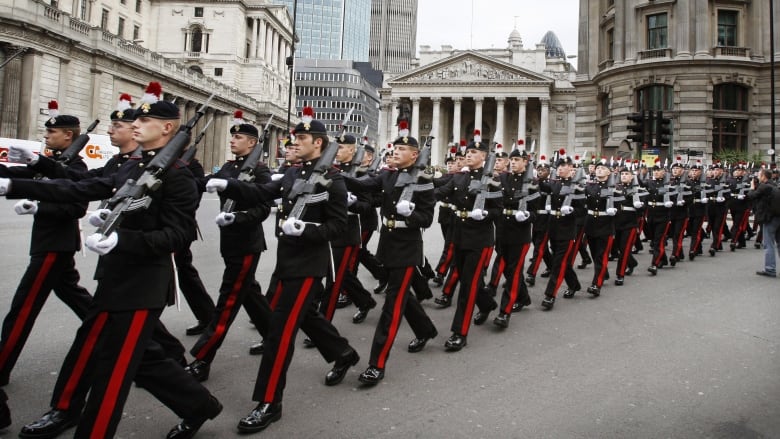Arrest of alleged neo-Nazis in British army shows U.K. is 'waking up to the threat of the far right'

The arrest of four British military members suspected of being part of a neo-Nazi group shows the U.K. is "waking up to the threat of the far right," says an extremism researcher.
Police have charged four army members under the Terrorism Act on suspicion of being part of National Action, a group the U.K. has described as "virulently racist, anti-Semitic and homophobic."
Police say while there was "no threat to the public's safety," the four men were suspected of being involved in the "commission, preparation and instigation" of terrorism acts. They range between the ages of 22 and 32.
Dan Jones researches far-right extremism at the University of Northampton, and studies groups like National Action. Here is part of his conversation with As It Happens host Carol Off.
What did you think when you heard the news that four British soldiers still serving in the army have been arrested as being members of this notorious neo-Nazi group?
I mean, obviously, it's a very concerning development. And it certainly says a lot about the lack of monitoring of the far right groups and their activities. And about their targeting strategies — the fact that they can get themselves access to weaponry and training any way they can.
Can you tell us a bit about this group, National Action?
National Action was set up in 2013 and they really use shock tactics to make a name for themselves in what is quite a crowded area of extreme right.
They hold large events in town centres screaming racist material over loudspeakers. They cover themselves with bandanas and hoodies. They throw Nazi salutes in Holocaust memorial sites.
- AS IT HAPPENS: Who are the far-right Proud Boys ?
- AS IT HAPPENS: Why a anti-migrant ship was briefly detained
They tweeted anti-Semitic abuse to various MPs and have made a name for themselves championing far-right terrorists. They spoke up quite a lot for Anders Breivik who perpetrated the attacks in Norway in 2011. And they also championed Thomas Mair who shot and stabbed British MP Jo Cox in 2016.
- AS IT HAPPENS: Colleague remembers slain MP Jo Cox
Why do you think its taken so long for them to begin to act on these organizations?
I think part of it is they don't perceive the threat as being credible or serious. If you look at the focus in reporting, or across government funding, there's been this move towards looking at radical Islam.
And yet, from the far-right, we've seen various knife attacks, attempts to develop bombs ... but Islamic terror is an easy target, and politically much easier to create that sense of other or an outsider.

What do you think this signals? Do you think you're going to see more arrests of this nature in the U.K.?
I think, regrettably, we will see more arrests of this type. I think there is a waking up to the threat of the far right, especially after the events in Charlottesville.

And what about the British military? Do you think it will be doing some pretty serious searching through its rank and file at this point?
I think they're going to probably re-evaluate some things. They've faced this historically.
There was an infiltration of the army cadet force by a neo-Nazi group called Column 88 in the '70s and '80s. So, [the British military] have faced this before. But I think there will be some red faces and they will be certainly looking at how their intelligence services can work better with the police at home.
With files from Canadian Press. This interview has been edited for length and clarity. For more, listen to our interview with Dan Jones: